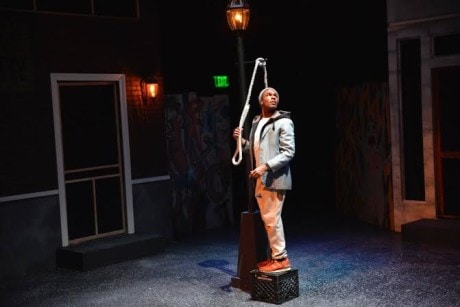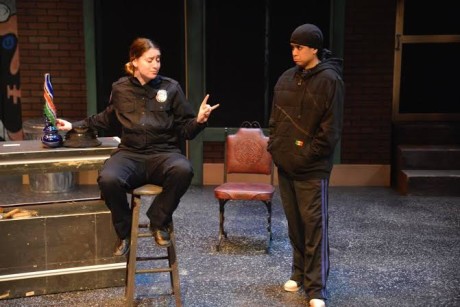Bertolt Brecht’s tale of the struggle to be good under the weight of capitalism is brought to the streets of Baltimore in Director Stephen Nunns’ lively and profound production of Bertolt Brecht’s The Good Person of Setzuan at Towson University.

The play opens with Wang, a water seller, foretelling the arrival of a trio of gods to the city. When the gods (characterized as President Obama, Sarah Palin, and Bernie Sanders) arrive, the water seller begs his neighbors to give them shelter for the night. The only one who concedes is Shen Te (pronounced shawn-tay), a prostitute struggling to make ends meet. Before the gods depart the following morning, they tell Shen Te the purpose of their journey was to find a person who lives according to their principles, and she was the only one they found to have a pure heart and charitable nature.
Shen Te asks them for money, sincerely explaining that it would allow her to be even more giving. They give her enough to buy a modest head shop, The Grass Menagerie, but they do so to test her generosity, believing that “a circumspect gardener can work wonders on a small patch of land.”
Shen Te uses her money to provide for her neighbors as much as she can—she brings them chicken every morning, but her shop is quickly overrun by old acquaintances, homeless and keen on taking advantage of her newfound wealth.
To protect herself from abuse, Shen Te invents an alter ego by concealing herself in oversized clothes and a du-rag, and introduces herself as her cousin, Mr. Shui Ta. Through Shui Ta, she takes callous and increasingly cruel measures against her neighbors in order to preserve the good nature of Shen Te.
Despite the weighty subject matter common in Brecht’s writing, Nunns’ production entertains without being heavy-handed. The cast easily blend their lines with conversational slang while mixing in plenty of laugh-out-loud quips to lighten the mood of what is otherwise a pretty tragic story. The chemistry and funny moments between Lashea Johnson, Jake Zeranko, and Rusty Hrabe, who play Wife, Nephew and Husband respectively, make them stand out among the supporting cast.
In particular, Jared M. Swain’s spirited stage presence in his performance as Sun, Shen Te’s deadbeat fiancé, is the most enjoyable to watch on a purely theatrical level. Mani Yangilmau is moving both in the raw vulnerability she shows as Shen Te and in her anger and coldness as Shui Ta. Her most chilling moment is delivered in one word at the very end of the play.

Additionally, the onstage band is comprised entirely of cast members who proved to be skilled both musically and theatrically. Cabaret-style songs composed by Nunns and musical directed by Taylor Rieland give insight into the thoughts and feelings of the characters and add to the entertainment factor of the show. Yangilmau, who sings the bulk of the music, is poignant in songs like “I Want to Go With Him” and “Song of the Child.” The three gods, played by Kaya Vision (Obama), Allison Bradbury (Palin), and Rieland (Sanders) harmonize delightfully in “Gods’ Hymn”—and do spot-on impressions of the politicians—but I was left wanting to hear more from them. The best musical moment happens during a larger-than-life dance scene in “Trio of the Disappearing Gods,” but going into too much detail might spoil it.
Interpreting the play as a cautionary tale of the futility of morality is limiting—Brecht was a proclaimed Marxist, and used his writing to explore the oftentimes oppressive relationship between a society’s economic system and the self. His argument seems to be that capitalism causes us to become estranged from vital parts of our nature—this is evident when Mr. Shui Ta exploits his neighbors by essentially forcing them to work in his weed factories for small wages, something Shen Te never would have done if circumstances hadn’t made it necessary. By the end of the play, it’s clear the end doesn’t justify the means.
Nunns’ production adeptly applies Brecht’s socio-political commentary to inner city Baltimore. Scenic Designer Logan Lynch’s well-crafted rowhouses with their half-boarded up windows and the colorful murals painted on the fences that run the perimeter of the set make you feel like you’ve walked into the theatre only to find yourself on Greenmount Avenue (this is partly because the path to the house runs through the set). The connection to Szechuan hangs above the band as an ad for a Chinese restaurant that reads “ Szechuan Palace: Just Around the Corner.”
Nunns, who lives in Baltimore, saw the parallels between Brecht’s play and the struggles faced by low-income residents in a capitalist society.
From this perspective, it’s difficult to condemn Shen Te’s neighbors as selfish or bad—they just can’t afford the luxury of being good. Even the gods, who preach about goodness and generosity fall short—they keep their distance from Shen Te, shrugging off her problems by saying things like “suffering makes her stronger” and “we’re only here to observe.”
Nunns’ choice to portray the gods as politicians reflects the dispassionate way that political figures often respond to problems in cities like Baltimore. The combination of the set, realistic sound effects and exquisite and dynamic lighting design by Josh Schuman creates an immersive experience. Costume Designer Julie Potter did some great work making the clothes look like real, everyday urban wear with lots of converse, moo moos, and beanies.
Nunns brings vibrance and lightness to Brecht’s daunting message without detracting from it.

It was a little off-putting when the audience laughed during the final scene, which is surely intended to be unsettling, but in retrospect, the laughter proves the production’s capability in making Brecht’s anti-capitalism criticism appealing to an audience that sees theatre as a medium for entertainment above anything else. Those familiar with Brecht will appreciate this fresh and relevant take on his script.
Running Time: Three hours, with an intermission.
The Good Person of Setzuan plays through April 9, 2016 at The Towson University Department of Theatre Arts performing at The Center for the Arts’ Studio Theatre – Olser Road in Towson, MD. For tickets call the box office at (410) 704-2792 or purchase them online.
RATING:
The review is by Taylor Deville.





